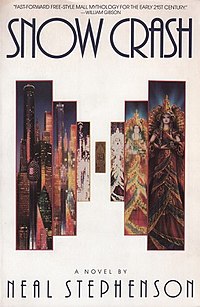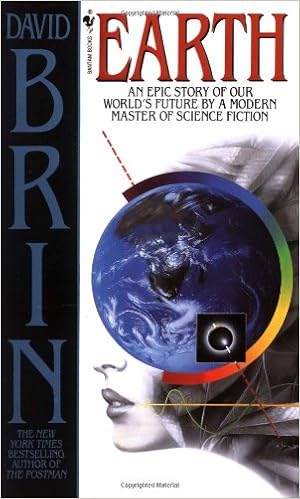Recently, while reading ‘Existence’ by David Brin I was
struck by its’ similarity to an earlier novel of his, ‘Earth’ which in turn
made me think about just how affected I had been by that work. This lead me to
thinking about all the SF books that had really rocked me, and I decided that
it was time for a list.
My (self-imposed) rule was to limit authors to two books at
most, and that seemed to work fairly well.
All these books are brilliant, but the order also reflects
my opinion on how they rank against each other (finishing with the best).
Against a Dark
Background
Use of Weapons
Iain Banks is best known for his Culture novels, and they
are a ton of fun. Space ships with insane names, bad attitudes, and a taste for
intrigue; they tolerate the human meat sacks, but only to a point. Use of Weapons uses a common Banks
outsider protagonist to introduce the Culture, but also has a wonderfully dark counterpoint
stemming from the main character.
Against a Dark
Background is one of the best dystopian SF novels I have
read. Filled with creative and dark characters, toys and thoughts, this is a
book that showed me what imagination was. This is one of Banks’ rarer
non-Culture SF books, and a great stand-alone read.
Hyperion
The Rise of Endmyion
When I first finished Hyperion
I threw it away, I was absolutely disgusted that the characters that I was
so invested in had just been left at the moment of climax. It was only 18 months
later that I discovered that there was a second book, and all was forgiven. The Hyperion Cantos is dark and
powerful SF, a fascinating look into what happens when religion and artificial intelligence
combine. Dan Simmons is a horror writer and it does show, but this horrific
vision has a powerful arc, with a touchstone that is our own humanity. The Rise of Endmyion was particularly
notable because of how well it brought the series of books together, in a way
that I though was going to be almost impossible.
Earth
Startide rising
What sets David Brin apart from the other authors here, is
his attempts to think about the environment and the moral implications of what
humanity does with the Earth. Earth
was a 40-years in the future SF novel, one of the hardest to write, but it is
done is such a lovely way, introducing us to all the scientific ideas and areas
of debate about the future of this Planet and humanity itself.
Startide Rising,
one of the Uplift novels, is set in a
more distant future, where humanity has been contacted by aliens, and we are
bottom of the food chain. In this universe the primary aim is to help other
races evolve intelligence, to uplift them, and humans are the only orphan race
in the galaxy. I loved the first trilogy in this series and setting up humanity
as the underdog certainly makes you empathise with the characters.
Frank Herbert
Dune
Proper space opera, with sword fighting, giant worms, and an
empire based around one thing, melange. The world building in Dune is
fantastic, and the feudal nature of the characters also works well, making
loyalties and betrayals even more powerful. This is the classic SF novel, it
won every prize in its’ day and remains pure genius.
Daniel Keys Moran
The Long Run
Unlike the other authors on this list, Daniel Keys Moran is
a relative unknown. This stuns me, because the first few books in his series of
the continuing time are as action packed and complexly plotted as any series I
have read. The books give you a feeling of scope and vision that sadly DKM has
not yet been able to fully realise, but they are just as good as stand-alone
novels. The Long Run is a fantastic
action tale, based around a strong central character, a thief who is becoming a
god. The Last Dancer, however is
something else entirely, partially written thousands of years in the past, and
partially during a new American Revolution, it is just too much fun.
Neal Stephenson
Snow Crash
Anathem
 From the first page of Snow Crash you know that you are
reading the best damm SF you have ever laid your hands on. If Vernor Vinge
makes you think about the universe, Snow Crash smashed a near-future America
into your face with stunning power. A sword wielding hacker against a modern
day Howard Hughes armed with Sumerian brain-control is completely over the top,
but it is the setting of this novel that truly gives it its’ power. The vision
of privatised America and the avatars of the future on the ‘Metaverse’ is one
that has already shaped much of the Internet as we know it (Mainly because all
the real geeks read, and loved, this book).
From the first page of Snow Crash you know that you are
reading the best damm SF you have ever laid your hands on. If Vernor Vinge
makes you think about the universe, Snow Crash smashed a near-future America
into your face with stunning power. A sword wielding hacker against a modern
day Howard Hughes armed with Sumerian brain-control is completely over the top,
but it is the setting of this novel that truly gives it its’ power. The vision
of privatised America and the avatars of the future on the ‘Metaverse’ is one
that has already shaped much of the Internet as we know it (Mainly because all
the real geeks read, and loved, this book).
The more I read Anathem the better it gets. I still cannot believe the publishers allowed Neal
to print a book that is basically
a philosophy primer. It is brilliant. The world, the characters, the plot are all
absolutely original. The fact that 'humans' actually turn up later in the book
only adds to the power of the novel. The book begins focused on a tiny 'monastery'
in the North, and ends encompassing the entire world within which it is based.
Amazingly for Neal Stephenson, probably
his best ending since 'The Big
U'.
Vernor Vinge
A Fire Upon the Deep
A Deepness in the Sky
 A Fire Upon the Deep
blew me away when I first read it. Here
was a truly original set of aliens, here
was a guy who was applying the changes in communication heralded by the
internet to the Universe, and the story itself was brilliant. I loved having to
work out what the aliens were from within their own points of view, and I loved
the ‘Zones of thought’ concept. The second book in that universe, A Deepness in the Sky had its’ own unique aliens, and a completely different
world view from the first book. Deepness also
had a marvellous multi-tiered plot that was beautifully constructed.
A Fire Upon the Deep
blew me away when I first read it. Here
was a truly original set of aliens, here
was a guy who was applying the changes in communication heralded by the
internet to the Universe, and the story itself was brilliant. I loved having to
work out what the aliens were from within their own points of view, and I loved
the ‘Zones of thought’ concept. The second book in that universe, A Deepness in the Sky had its’ own unique aliens, and a completely different
world view from the first book. Deepness also
had a marvellous multi-tiered plot that was beautifully constructed.
This is SF at its’ very best, testing your own vision,
questioning our assumptions about life, the fundamental laws of the universe
and where we stand in it. The absolute cornerstone of Science Fiction.
So that's my list, I would love to hear from anyone who feels that they know of a book that could stand up against these, as my reading list is always looking for expansion...
So that's my list, I would love to hear from anyone who feels that they know of a book that could stand up against these, as my reading list is always looking for expansion...



